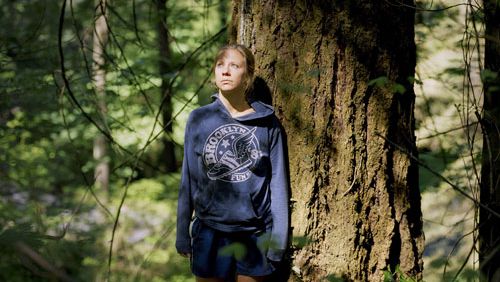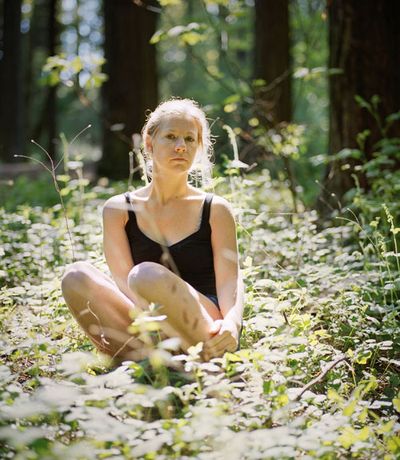Stranded
It was supposed to be easy, a brisk 30-minute hike on a pristine summer day. But a wrong turn led one woman on a brutal quest for survival. A year later, she shares her harrowing story.

I woke up to a gorgeous Portland, Oregon, morning: 80 degrees, sunny, the perfect weather for a camping trip. Which meant at least one thing was going in my favor. I was hungover, thanks to too many drinks with a girlfriend the night before, and not exactly up for the wilderness. But the trip had been planned for a while, so I got myself together and went to pick up my boyfriend, Aric.
It was an easy 90-minute drive to Mt. Hood National Forest — a breathtaking, rugged park stretching 60 miles south from the Columbia River Gorge — and we zoned out, listening to bluegrass music. We'd done our share of major hikes, but this one was going to be mellow. The campsite was a mere half-hour walk through the woods, and we were staying only one night. Aric would play his guitar and mandolin, we'd chill. But like the hungover morning itself, nothing about this trip went as planned.
Halfway into the walk to Bear Lake, just south of the gorge, Aric and I started to argue. It was the same fight that always plagued our otherwise happy relationship, which had begun soon after I moved to Portland a year and a half earlier: At 28, I wanted to have a family, while he wanted to chase his wanderlust. Worse, once we got to the campsite, we realized it was too close to the trail. We decided to dump the gear, and, instead of looking together — I was too angry — we split up to find a more remote spot.
That was when a bad day turned disastrous.
It was 1:30 p.m. when I set off in my tank top and shorts to explore the left side of the small lake. Not finding a trail, I bushwhacked through the brush and, having meandered more than I realized, lost sight of the water. I walked toward it, or so I thought, but no luck. Dusk was falling now and, worried, I drew maps in the dirt. Then below me I heard a stream, which would lead to the lake. I headed eagerly down a steep hill and followed the water before realizing it ran downstream.
I began to panic. It was almost dark now, and colder. Everything was at the campsite — even my cell phone. Feeling light-headed, I figured some seven hours had passed since I'd eaten.
Suddenly, thrillingly, I spotted the dark glimmer of a lake in the distance and charged blindly toward it. Seconds later, the ground literally dropped out from under me. I felt my body falling, a weightless sensation, more confusing than frightening, that seemed endless. I had dropped off, I learned later, a 50-foot cliff.
Get exclusive access to fashion and beauty trends, hot-off-the-press celebrity news, and more.
I don't remember hitting the ground or passing out, but when I woke, it was morning. Disoriented, aching, I saw a sickening gash on my right leg that cut clean through the tissue to underlying bone. It was still oozing blood. My other leg was bent at a weird angle below the knee, and I knew it was broken.
I wasn't even sure I could move, but when I heard running water, I felt reassured. I knew it likely flowed into the Columbia River, which eventually reached a highway. I didn't dare contemplate how far away it might be. Gingerly, I pushed myself into a sitting position, and that's when I noticed the creek was below me in a steep, dark ravine. I'd have to scoot on my butt to get down there, then crawl. Every inch of my body ached, but there were no other options except waiting for someone to find me. Who knew how long that would be, if ever.
The pain was excruciating as I navigated the rocks and fallen tree trunks and maneuvered around waterfalls. Pricker bushes tore at my skin, my hands bled, my thighs were scraped. But I felt an unworldly focus, every sense heightened. For the first time in my life I was completely in tune with my body. I knew if I lost my balance I might not get back up.

Once in the deep creek bed, I began to crawl, trying like crazy to ignore the pain, taking breaks to rest and drink from the creek. Periodically in the distance I heard helicopters — I'm over here! — but they'd fade away. I felt like a wild animal: All my energy was focused on survival. Starving, I ate raspberries and salmonberries — I even tried caterpillars and, most disgusting, a slug, which I spit out but whose slimy taste lingered.
The day felt interminable. At times I was sure I couldn't crawl another inch. When the sun began to set, I felt relieved I could stop but was scared of another night alone in the woods. I dragged myself clumsily up to a flat area flanked by trees. The temperature felt like it had dropped into the 50s, and to try to get warm I tied the unattached part of my top's built-in bra over my head as a kind of mask, secured the tank's bottom around my waist with a shoelace to keep out the frigid air, then covered myself in moss. I fell into a restless sleep.
The intensity and sheer focus I put into these small acts of survival kept me from thinking about my injuries and whether I was headed the right way. I couldn't invest energy in worry. That's how you endure these kinds of things. The second you start letting your mind flirt with the worst-case scenario — well, you can't if you want to make it. You just can't.
I woke to the sunrise and throbbing of my torn-up hands. I pulled off my socks and chewed holes to make fingerless gloves. The wound on my leg looked worse, so I peed into my hands and put urine on the gash to keep it clean — a move I'd seen in a movie. Then I took off my pink-and-blue striped underwear, tying it around my leg as a tourniquet. Woozy, I wanted to sleep, but an urgent thought crept into my head: You've got to keep going.
I went back to the creek and continued, inch by brutal inch, on all fours. Around midday, I reached an impasse — a massive fallen tree. I had to scale it. I pulled myself up with excruciating effort, and saw that on its other side the land dropped and I'd have to jump onto rock. I was terrified my legs wouldn't hold me. It was too much. Two days after first getting lost, I became unhinged. I can't do this! I screamed over and over. I became delirious and thought I saw a friend who had died in a freak bike accident; then trippy memories of other old friends and family, people I hadn't seen since I'd moved, flitted through my head. I felt overwhelmed by a profound sadness that I'd never see them again, would never have a family of my own.
No, I thought weakly, I'm not done yet. It's strange, what your body tells you you're capable of and what your mind convinces you instead. With the last of my reserves, I jumped.
Pam! Pam! I looked up and saw them, the Crag Rats, members of the volunteer search-and-rescue team, hiking down a steep slope on my third day lost. I wasn't sure I could trust my eyes, but as they got closer, I was flooded with relief and then pure, unmitigated joy. I was saved — I was safe. Soon the helicopter returned, lowered a medic, and flew me to the hospital where Aric was waiting. There, I learned that, incredibly, I had crawled about a mile and a half with a broken left tibia, the second-largest bone in the body, and six fractured vertebrae in my back. The worst pain, though, was my butt: I had rubbed nearly all the skin off it from scooting. It was like a first-degree burn, tender and raw.
I had surgery on my broken leg a few days later and after went to my parents' in Massachusetts, where I stayed for two months to heal. I worried about returning to Portland, knew I couldn't explain to friends I barely knew what it felt like to be so close to death. I also worried I'd be dependent on Aric, who made it clear he was there for me both emotionally and physically. But then I had a profound realization: I didn't need understanding, didn't need Aric's reassurances — I was OK on my own. I was stronger than I ever knew, and more courageous. I could go anywhere, do anything.
Aric and I decided to take a break not long after. I realized I had to think about committing to a man who might not want the same things as I did. I also recently applied to graduate school to study art therapy and eco-psychology, which helps people reconnect with nature. It sounds cliché, but the experience of fighting for myself, and my future, helped me see clearly for the first time. When I think about those days in the woods, I'm astounded — was it really me? Did I do that? I still go hiking, especially when the grind of daily life takes over. It's every bit as exhilarating as it was before my accident, maybe even more. It reminds me of how I beat the odds by force of will. That's a powerful feeling. Except now, I make sure to stick to the trail.